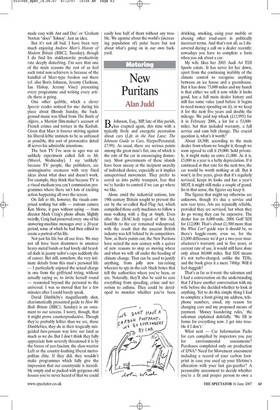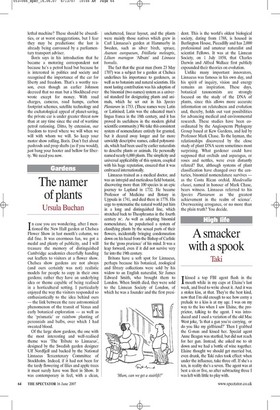New Puritans
Alan Judd pJohnson, Esq., MP, late of this parish, . has erupted again, this time with a typically lively and energetic peroration about cars (Life in the Fast Lane: The Johnson Guide to Cars, HarperPerennial, £7.99). As usual, there are serious points among the great man's fizz, one of which is the role of the car in encouraging democracy. Most governments of these islands have been uneasy at the incipient anarchy of individual choice, especially as it implies unsupervised movement. They prefer to corral us into public transport, fear that we're harder to control if we can go where we like.
Alone amid the industrial nations, late 19th-century Britain sought to prevent the car by the so-called Red Flag Act, which compelled those early machines to follow a man walking with a flag at 4mph. Even after the (RAC-led) repeal of this Act, hostility to the car remained widespread, with the result that the nascent British industry was left behind by its competitors. Now, as Boris points out, the New Puritans have seized the new century with a quiver of new reasons to stop us moving where and when we will: all under the heading of climate change. That can be used to justify anything, from jolly new tax-raising wheezes to spy-in-the-cab black boxes that tell the authorities where you've been, or are. Naturally, they'll also be said to cure everything from speeding, crime and terrorism to asthma. They could be developed to monitor whether you've been drinking, smoking, using your mobile or abusing other road-users in politically incorrect terms. And that's not all, as I discovered during a call on a dealer recently: nowadays you have to complete a form when you ask about a car.
My wife likes her 2003 Audi A4 TDI Sports estate. It has never let her down, apart from the continuing inability of the climate control to recognise anything between an ice house and a greenhouse. But it has done 73,000 miles and my hunch is that either we sell it now while it looks good, has a full main dealer history and still has some value (and before it begins to need money spending on it), or we keep it for the next five years and double the mileage. We paid top whack (£13,995) for it in February 2006, a lot for a 53,000miler, but that included warranty, a full service and cam belt change. The crucial question is, what's it worth?
About £8,500, according to the main dealer from whom we bought it, though we soon agreed to call it £9,000. Sold privately, it might make an extra £1,000. As it is, £5,000 in a year is a hefty depreciation. If it continued at that rate for the next two, the car would be worth nothing at all. But it won't; in five years, given that it's regularly serviced, keeps its looks and has a year's MOT, it might still make a couple of grand. So in that sense, the figures say keep it.
The figures that might say otherwise are unknown, though it's due a service and new rear tyres. A4s are reputedly reliable, provided they are serviced, but when they do go wrong they can be expensive. The dealer has an 8,000-mile, 2006 Golf SDI for £12,000. That's about £1,500 more than the What Car? guide says it should be, so there's haggle-room; even so, for the £3,000 difference we'd get a two-year manufacturer's warranty and in five years, at current rate of use, it would still have done only about 80,000 miles. But SDI means it's not turbo-charged, unlike the TDIs, and the book gives it a mere 74bhp. Will it feel sluggish?
That's as far as it went: the salesman and I had a conversation on the understanding that I'd have another conversation with my wife before she decided whether to look at anything. Yet to do this simple thing I had to complete a form giving my address, telephone numbers, email, my reason for changing cars and my proposed means of payment. 'Money laundering rules,' the salesman explained dolefully. 'We fill in forms for everything now. I get into trouble if I don't.'
What next — Car Information Packs for cars compiled by inspectors you pay for environmental assessments? Purchases completed only on production of DNA? Need for Movement assessment including a record of your carbon footprint in case you used up your lifetime's allocation with your last gas-guzzler? A personality assessment to decide whether you're a fit and proper person to own a lethal machine? These should be absurdities, or at worst exaggerations, but I fear they may be predictions: the last is already being canvassed by a parliamentary transport adviser.
Boris says in his introduction that he became a motoring correspondent not because he's a petrol head but because he is interested in politics and society and recognised the importance of the car for liberty and freedom. That's a worthy reason, even though an earlier Johnson decreed that no man but a blockhead ever wrote except for money. With road charges, cameras, road humps, carbon footprint schemes, satellite technology and the eschatological appeal of planet-saving, the private car is under greater threat now than at any time since the end of wartime petrol rationing. Ditto, by extension, our freedom to travel where we will when we will with whom we will. So keep your motor show rolling, Boris. Don't fret about pushrods and prop shafts (as if you would), just bang your hooter and bellow for liberty. We need you now.





















































 Previous page
Previous page